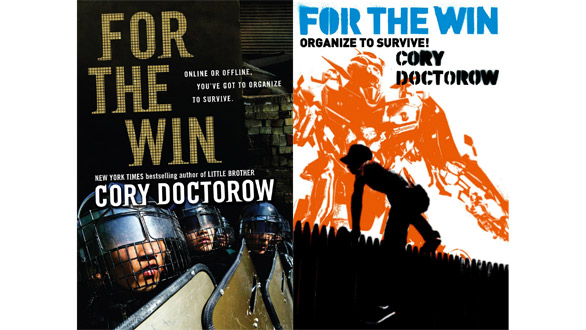Cory Doctorow, Tor and craphound.com, 2010
The Spark December 2010 – January 2011
Byron Clark
 ‘For The Win’ is possibly one of 2010’s best works of fiction, at least for those readers who enjoy books that deal with big issues. Paraphrasing other writers in the genre, author Cory Doctorow has said that “good science fiction predicts the present” and part of what makes the novel so enjoyable is that this story could be taking place next year. While his last novel, Little Brother, explored issues around civil liberties and state power in the post-9/11 USA, For The Win shows that Doctorow’s unashamedly left-wing worldview extends to many other issues; globalisation, inequality, labour rights and the farcical nature of finance capitalism are all explored in the space of 375 pages.
‘For The Win’ is possibly one of 2010’s best works of fiction, at least for those readers who enjoy books that deal with big issues. Paraphrasing other writers in the genre, author Cory Doctorow has said that “good science fiction predicts the present” and part of what makes the novel so enjoyable is that this story could be taking place next year. While his last novel, Little Brother, explored issues around civil liberties and state power in the post-9/11 USA, For The Win shows that Doctorow’s unashamedly left-wing worldview extends to many other issues; globalisation, inequality, labour rights and the farcical nature of finance capitalism are all explored in the space of 375 pages.
The story revolves around “gold farming” the practice of amassing virtual wealth in an online multi-player video game, and then selling it for real-world currency. Typically, that virtual wealth is collected by people in the developing world, and sold to players in the developed world who want to avoid the work required to advance in the game. For the gold farmers, the income is comparable to what they could earn working in other available jobs. Of course, most of these gold farmers don’t own the computers and internet connections required to be a gold farmer (the means of production-albeit production of virtual commodities) and work for bosses who expropriate most of the wealth they create. Looking to remedy this situation is Big Sister Nor, a former garment factory worker in Malaysia who became a gold farmer after a strike caused the owners to move the factory to Indonesia. Nor has founded the “Industrial Workers of the World Wide Web” or “Webblies” (a homage to the Industrial Workers of the World (also known as Wobblies), the syndicalist union that had its heyday a century ago) and is organising gold farmers across borders in the virtual worlds they work in.
The story alternates between Nor’s group of organisers located in Singapore, and Leonard Goldburg (a teenager in LA who joins the cause of the gold farmers he befriends in-game), and further groups of gold farmers in Dharavi (India) and Shenzen (China). In switching between the locations, Doctorow is able to paint a vivid picture of the disparity between the United States; the planets largest slum, and the new ‘factory of the world’.
In parts you almost feel as though to be breathing the fumes of Dharavi’s plastic recycling plants. Shenzen, where most of the novel’s climactic action takes place, is like the archetypical dystopian city of cyberpunk fiction. But this is a post space-race subgenre of science fiction that is more down to earth (literally), as it often explores social issues, and is infinitely more realistic because the sweatshops, heavy handed police force, and authoritarian state exist today.
The novel also includes explanations of global economics between chapters (some influence of Doctorow’s Marxist parents is visible here). These are well placed and serve to reinforce parts of the story rather than distract from it. The only criticism I could make would be that with so many important characters there is little room for character development. A small number of characters are given elaborate back stories, but few change throughout the novel. This is a minor point however and For The Win is a thrilling read that should be in every high school library. An in-depth knowledge of economics, labour history, and massive multi-player video games is not required to enjoy it.

Just another WordPress site